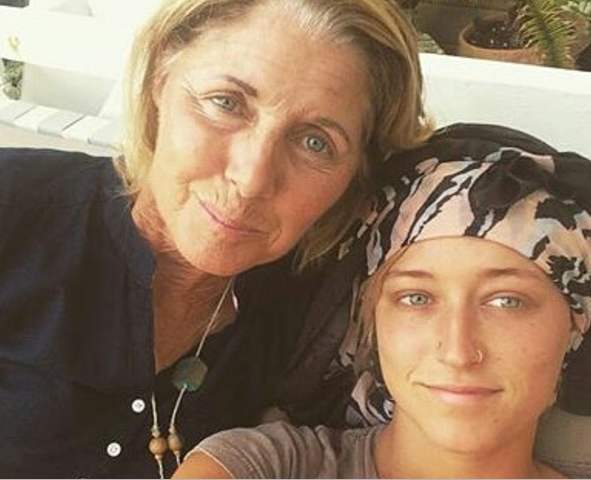So far, most of my columns have been pretty upbeat, although centered around a pretty heavy topic. This week, I’m getting a bit more personal and exploring an illness facet not usually spoken about. We read or hear about how cancer affects survivors and their families, but not much about the challenges of having cancer while loved ones are also sick.
I come from a long line of cancer genes. I lost my grandfather and auntie to cancer, and witnessed two other aunts endure breast cancer. I honestly never imagined it would happen to me. When I was 20, living in Colombia, my father got esophageal cancer. He had surgery to remove his entire esophagus. His life changed forever. His way of looking at the world — his spirituality and perspective — radically shifted. I was overseas and could do very little to help him, except offer emotional support and love. Luckily, the operation was a success, and since his recovery, he’s become a more open, kinder, gentler, and loving person, and my best friend.
Yet, nothing has impacted me as profoundly as my mother’s illness. When I was 19, doctors diagnosed my mother with dementia. The disease causes a gradual decline in a person’s memory and ability to perform everyday tasks. Alzheimer’s is the most common form of dementia, although my mother’s diagnosis was vascular dementia. She’d suffered from a little memory loss here and there, sometimes forgetting to pick me up from school or repeating a story, but it was never something that alarmed us.
Over the years, this forgetfulness got worse, and she was diagnosed in 2012. The news hit me pretty hard. I didn’t understand what the disease was at first, or how fast the deterioration would be. When I returned home a year later, she was still my mother. However, those first few years back home, when I was in college, her health and mental well-being declined dramatically. She could no longer drive, make meals or create art (her career and passion), and eventually couldn’t use the bathroom on her own. She needed my father for almost everything. Losing my mother — my beautiful, intelligent, sensitive, kindhearted, creative mother — in this slow and disorientating way was heartbreaking. I tried to be strong; find ways to cope. It wasn’t easy to deal with, but it was manageable. That was, until my diagnosis.
Going through a disease like lymphoma, while your mother is too ill to understand what’s happening to you is otherworldly kinds of difficult. It was in those moments of hair loss, hospital visits, chemo sessions, and days when I couldn’t get out of bed, that I felt like I needed my mother the most. I longed for her to hold me, to say it would be OK. I longed for her to say I still looked beautiful, even with my bald, patchy head. Unfortunately, she wasn’t able to be that person for me.
Dealing with cancer while those around you are ill is beyond tough and frustrating. A big part of you craves the limelight. You want everyone to focusing on you and your recovery. But the reality is that life doesn’t work like that. We find that we have to be extra strong in the face of this kind of hardship.
I divulge these details not to depress you, but rather to be truthful. Sometimes we’re sick and have a huge support system and other times we’re sick, amid a sea of sickness. Fortunately, I didn’t have to do it all alone. My father was my rock during this ordeal, having dealt with cancer himself. And, of course, my friends. What a blessing friends are. The family we get to choose. I had an incredible group of people who took care of me. A best friend who drove me to every chemo session. Friends who threw me a big “f*** cancer” party at the end of it all.
The truth is, we don’t get to choose what happens to us in life, and we don’t get to choose what happens to people we love. We can’t control these things but what we can control is how we deal with pain and whom we choose to lean on, whether it’s our family, partners, friends, or an online support system. I have my friends as a grief outlet, and I’ve found relief in women’s circles, meditation classes, nature, and the support of other cancer survivors, many of whom I met on social media. Simply through searching #Hodgkinslymphoma on Instagram, I connected with so many strong, powerful survivors who helped me get through each day, one step at a time.
Ultimately, it is important to know that whatever you are going through, and however difficult it may be, you aren’t alone. Ever. Even if your home situation is far from perfect, you have to remember there are people out there willing to hold you, comfort you, and help you get through this.
***
Note: Lymphoma News Today is strictly a news and information website about the disease. It does not provide medical advice, diagnosis, or treatment. This content is not intended to be a substitute for professional medical advice, diagnosis, or treatment. Always seek the advice of your physician or other qualified health provider with any questions you may have regarding a medical condition. Never disregard professional medical advice or delay in seeking it because of something you have read on this website. The opinions expressed in this column are not those of Lymphoma News Today or its parent company, BioNews Services, and are intended to spark discussion about issues pertaining to lymphoma.


